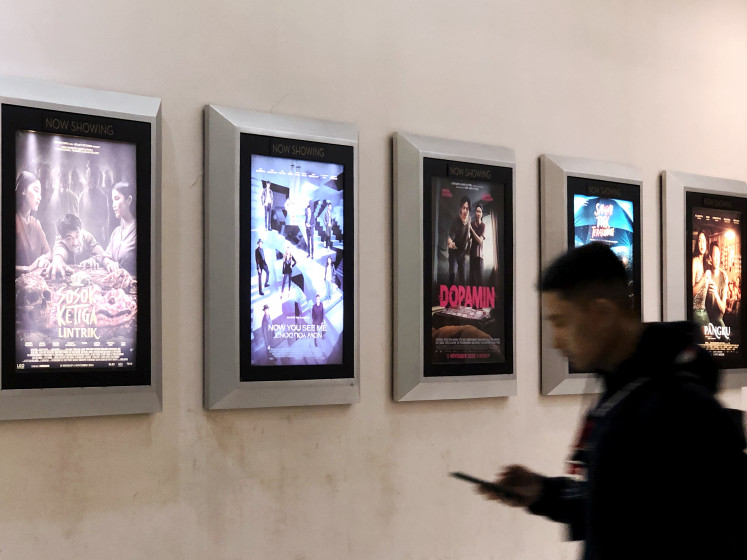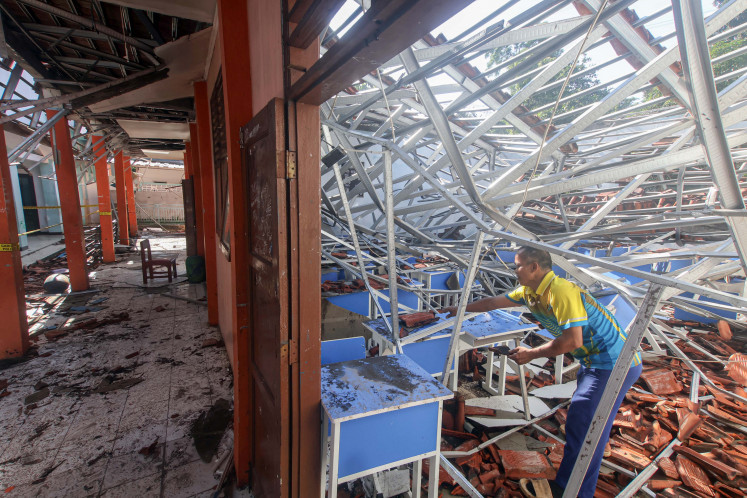Popular Reads
Top Results
Can't find what you're looking for?
View all search resultsPopular Reads
Top Results
Can't find what you're looking for?
View all search resultsAceh sharia police loved and hated
Hearing the words Wilayatul Hisbah (WH) or the sharia police, many people would imagine that the figures would be very pious and very religious individuals: officers wearing Islamic uniforms very similar to the Taliban in Afghanistan, or at least similar to the inhabitants of pesantren (Islamic boarding schools)
Change text size
Gift Premium Articles
to Anyone
H
earing the words Wilayatul Hisbah (WH) or the sharia police, many people would imagine that the figures would be very pious and very religious individuals: officers wearing Islamic uniforms very similar to the Taliban in Afghanistan, or at least similar to the inhabitants of pesantren (Islamic boarding schools).
The one thing that distinguishes the sharia police from ordinary people is the belief that the police must be people who know everything about Islam and Islamic law violations.
The existence of the sharia police was recently brought into the public spotlight due to a rape committed by three sharia police officers against a female student who was detained at the police station a few weeks ago.
“This is the evidence that since the beginning the establishment of the sharia police was set up without enough preparation,” said Syarifah Rahmadtilah, director of Mitra Sejati Perempuan Aceh, a women’s non-governmental organization.
Syarifah said, long before the sharia police were formed, her organization was trying to advocate and to help the government prepare the sharia police, so it could become an example for society.
“Before watching over the morals of the others, the police must first prepare their own morals,” Syarifah said.
Sharia police had committed many violations against ordinary people, but people were afraid to criticize directly for fear of being considered against the application of sharia law in Aceh.
Syarifah said the police often committed human rights violations when they conducted raids against sharia violators.
“Women who are arrested are often caught, slapped, loaded into an open truck and charged with violating sharia law. It’s a very painful thing for the community,” she said.
The main function of the sharia police is to oversee the implementation of sharia law, she said, and the regulation on their duties clearly state that sharia police have no right to detain someone.
They can only advise and disseminate Islamic sharia law to the public.
“What is happening today is just the opposite. They see themselves as angels who oversee public morals. Even they [think they] have the authority to punish those suspected of violating sharia law.”
The sharia police put themselves one step below God, and see themselves as servants of God to watch over the people of Aceh, which is dubbed Mecca’s veranda, Syarifah said.
In line with Syarifah, Norma Manalu, from the Aceh Human Rights Coalition non-governmental organization has asked the Aceh government to reassess the need for sharia police in Aceh.
“I think there should be no sharia police, because the enforcement of Islamic laws can be done by ordinary police officers, as the obvious upholders of the law,” Norma said.
Norma believes that all the violations which are categorized as violations of Islamic laws, such as gambling and liquor consumption, can be handled by the regular police, since only a few violations, such as seclusion and certain banned acts, are not covered in the Criminal Code.
“Seclusion and forbidden acts are private matters. Why should the police handle personal things like this,” she said.
Meanwhile, in contrast to the female activists, Yulia, a student from the Kindergarten Teacher Education Institute hoped that the government would give greater power to the sharia police in the enforcement of Islamic law in Aceh.
“Sharia police should not only monitor and advise the public that violate Islamic laws, but also they should have the authority to arrest and prosecute people who breach them,” Yulia said.
However, sharia police have been overreaching their authority, such as conducting raids on the street or on private vehicles, as happened in West Aceh recently.
— JP/Hotli Simanjuntak










